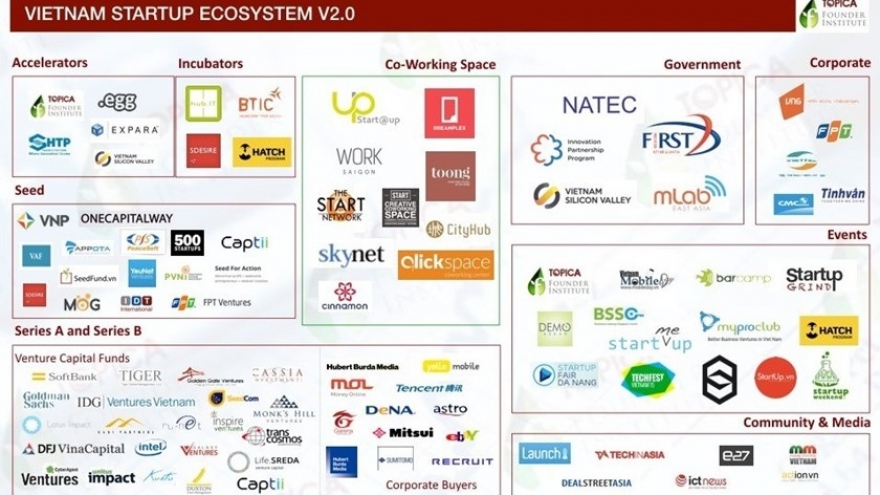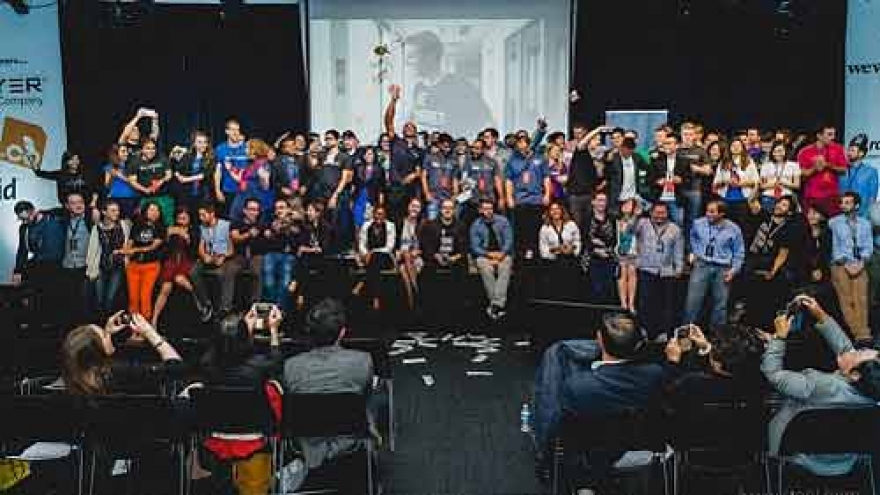World at startups' feet
Many Thai and Filipino students are now learning online under Topica Native’s education platform, which is now heading to Indonesia.
 |
Names likes Topica and Foody have not only become famous in Vietnam but have also expanded their presence overseas.
Last year Vietnam’s startup community saw 67 major investment deals (that were disclosed), an increase of 130 per cent compared to 2014, according to a report from the Topica Founder Institute.
There were also six acquisitions, with the highlight being a US$260 million deal for Misfit, which is now becoming a global name.
This all augers well for a future where Vietnamese startups are recognized around the world and become multinational corporations.
When and where
While some Vietnamese startups have made a mark internationally there are others that have the investment but are not planning to head overseas just yet. They choose to grow gradually instead.
“No success is built on unsustainable foundations, and we cannot run fast if we are standing in mud,” is how Mr. Pham Quang Huy, General Manager of Lozi, put it.
The million dollars in investment he received from Golden Gate Ventures and DesignOne Japan will be focused on product research and development (R&D) and human resources and market development first.
The startup aims to have its app on every young Vietnamese person’s smartphone before reaching out to the world.
Another example is Jupviec.vn, a startup in maid services that received investment from Japan’s CyberAgent Ventures in mid-January.
“Initially we will focus on the Hanoi market, then Ho Chi Minh City and other major cities in Vietnam,” said Mr. Phan Hong Minh, CEO of Jupviec.vn.
“We are in the service industry so we need to ensure quality before expanding. When we feel comfortable we will move on to other markets.”
Not everyone, however, believes it is necessary for startups to optimize their growth in Vietnam before penetrating into other markets.
According to Mr. Tran Tri Dung, MRM Specialist at the SECO Entrepreneurship Program, this is like a startup focusing on their products before selling them.
“The challenge is how to define a good product before selling it, with a reasonable measure probably being the level of market acceptance,” he said.
Meanwhile, Mr. Nguyen Quoc Binh, Director of the International Department at Topica Native, believes the decision to attack foreign markets heavily depends on the product itself and the culture and strategy of the startup and their timeline for implementation.
“Optimizing the domestic market would make operations more standardized, give the company time to think and to train staff more thoroughly, but slows down the process of heading abroad,” he believes.
As far as which market to head to is concerned, many in the field say that countries that are similar to Vietnam represent the best choice.
Topica looked at ASEAN first, as market research could be conducted faster and approaching such markets was easier, according to Mr. Binh.
“Countries that are close to each other share similar business environments, cultures and legal framework, making it easier to do business,” he said. Mr. Huy, on the other hand, believes it is not necessary to choose a similar market to achieve success.
The question is whether the company’s leaders understand the market they are eying or not.
“Similarities are just one factor that can help us to cut the time needed to get to know a country,” he said.
Paying attention
International competition is inevitable when reaching out to the world and also happens in the domestic market.
According to Mr. Dung, what he learned when he worked with Hamona Premium Coconuts, a startup in agriculture, is that the first thing to pay attention to is readiness.
The readiness of startups can be assessed via the market suitability of their products and services.
In order to lower costs, Mr. Dung said, startups usually rely on personal and social connections to deliver their products or services to consumers overseas.
While this method may be effective, the final goals of revenue and profit must be taken into account.
“The opinions of paying customers should be prioritized rather than those of non-paying customers,” he said.
The legal framework, the business environment, and payment habits of foreign markets also need to be noted. Startups generally lack the budget to conduct proper market research.
“Google and businesspeople already experienced in international markets are good sources of information, as are other startups in those markets,” Mr. Dung said.
Entering foreign markets always presents challenges. In the case of Topica, Mr. Binh said they faced a host of difficulties in taking their products and services to other countries. Most of the time these issues revolved around culture, markets, human resources, legal framework, and seeking business partners.
“For example, when we implemented Topica Native in Indonesia, the first problem was that Indonesians were unfamiliar with online education,” he explained. “But the biggest problem was that we did not have sufficient human resources.”
With challenges, though, come opportunities. Mr. Binh said that a strength of Vietnam is that its IT sector has remained one step ahead of most ASEAN countries.
Topica also had many experts and managers who were determined to enter into difficult markets. The key thing is to take the advantages and address the disadvantages.



